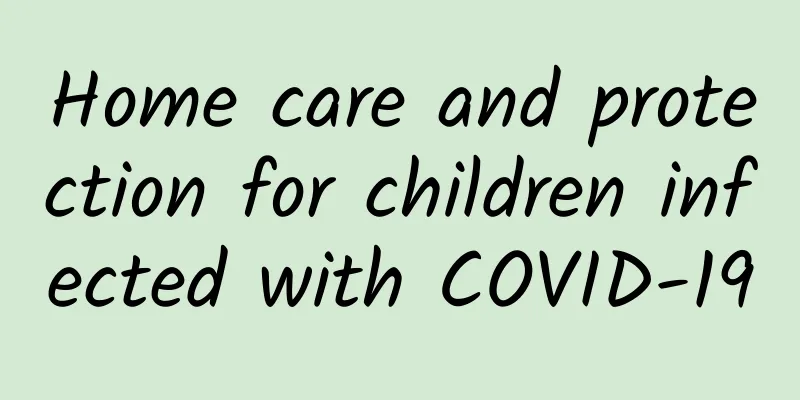Home care and protection for children infected with COVID-19

|
In view of the recent increase in COVID-19 infections, and in response to parents' concerns about family protection strategies for children and adolescents after COVID-19 infection, the Popular Science and Health Education Working Committee of the Chinese Medical Education Association jointly organized online expert lectures with various units to alleviate parents' anxiety, help teachers, students and families respond positively, and jointly protect the healthy growth of children and adolescents! Below, Professor Wang Quan, Director of the Department of Emergency Medicine at Beijing Children's Hospital Affiliated to Capital Medical University, explains how to use medications and care for children after they are infected with the new coronavirus and answers questions of concern to parents. 1. What are the characteristics of symptoms and course of children infected with the new coronavirus? Wang Quan: Children are also susceptible to the new coronavirus, and the main symptoms are basically similar to those of respiratory infections caused by other viruses. It may cause fever, cough, throat discomfort, sore throat, or nasal congestion, runny nose, etc. Some children may experience muscle aches, fatigue, vomiting, diarrhea, and a few children may experience febrile convulsions, wheezing, and suffocation. The entire fever course is about 2 to 3 days, and the course of the disease is about 3 to 5 days. 2. After children are infected with the new coronavirus, if they choose to observe recovery at home, what precautions should be taken in terms of the use of medicines and care? Wang Quan: After children are infected with the new coronavirus, the main care is symptomatic treatment. Regarding the choice of antipyretic drugs, I would like to remind all parents that if the baby is over 6 months old, then we can choose between ibuprofen or acetaminophen. If the baby is over 2 months old and under 6 months old, then we can only choose acetaminophen. When taking antipyretics, there are a few points I would like to remind parents: First of all, parents should not be too nervous. The degree of fever is not absolutely related to the severity of our disease. In addition, the purpose of taking antipyretics, in addition to hoping that the body temperature can drop to a certain extent, is mainly to increase the comfort of the child, so that our children can safely and comfortably pass this fever period, rather than just blindly pursuing the body temperature to drop to normal. Because under normal circumstances, after we take antipyretics, the body temperature can only drop by 1~2 degrees. As long as the child is not so uncomfortable, parents should not be too anxious. When taking antipyretics, it is not recommended to use two antipyretics alternately, nor is it recommended to take two antipyretics at the same time, because this may increase the burden on the child's liver and kidneys and cause adverse reactions. When taking medicine, the first thing is to be suitable for age, and the second is the dosage and time interval. You can't keep giving your child antipyretics because of nervousness, because it also has side effects. In addition to fever, children may also have some coughs. We do not recommend that parents give their children antitussive drugs on their own. Coughing is a protective reflex of the human body that helps us expel respiratory secretions. If a child has a cough or nasal congestion, you can use atomization, clean the nose, or increase the humidity of the air to improve airway comfort. If your child's cough has affected his or her daily life or sleep, you can take your child to the hospital and use some cough and expectorant drugs under the guidance of a doctor. If you give your child some compound cold preparations, you must carefully check the medicinal ingredients of the cold medicine to see if there are any overlapping ingredients with other medicines your child is taking at the same time, such as overlapping ingredients with some antipyretic drugs. If there are any overlapping ingredients, then you must use it with caution because it may cause an overdose of certain drug ingredients. 3. How can we protect our children as much as possible and reduce the risk of infection at this stage? Wang Quan: First of all, the first thing is to get vaccinated . The current COVID-19 vaccine cannot cover children under three years old. Secondly , parents are advised to protect themselves and their children, wear masks, wash hands frequently, do not spit, cover your mouth and nose with a tissue when coughing or sneezing, and maintain a safe social distance. Third, maintain a regular schedule, ensure adequate sleep, eat a balanced diet, eat more fruits and vegetables, drink more water, and exercise more. 4. When should you take your child to see a doctor? Wang Quan: We use the simplest way to judge, which is to observe the child's mental state. For example, although there is a fever and cough, but the mental state is very good, eating, drinking and playing as usual, and it does not affect daily life, you can treat the symptoms at home. However, if the child is infected and the mental state is particularly poor, always wilting, always wanting to sleep, or even the body temperature drops, and it also appears weak, we recommend that you seek medical attention in time. As long as children under three months old have a fever, it is recommended to go to the hospital for doctors to help the children. If there is frequent vomiting, diarrhea, bloody stools, or decreased urine volume, we also need to go to the hospital in time. If the child always describes a fixed pain in a certain part of the body during the course of the disease , or there is a mass in the abdomen, we should also go to the hospital in time. If the child has a febrile convulsion or impaired consciousness, these also need to be taken to the hospital in time. |
<<: Canalys: Global wearable device shipments to grow 4% in 2024
Recommend
Can I eat natto during menstruation?
Many female friends know that during menstruation...
Is egg retrieval harmful to women?
In clinical medicine, the method of in vitro fert...
All pictures of women's vulva
In daily life, women know very little about their...
Does irregular menstruation affect ovulation? Gynecologists answer
As we all know, women's ovulation is closely ...
No feeling of wetness during sex
Different things often happen when someone is hav...
How can girls get a six-pack?
Fitness is now a very common recreational sport. ...
Why do breasts swell?
In life, some women feel that their breasts are s...
How long is the best time to do Down syndrome screening during pregnancy
Nowadays, people pay more attention to the variou...
Can you eat mangoes on the roadside? Why can't you eat mangoes on the roadside?
In the south, we often see mango trees planted on ...
Why do women feel sore and weak in their legs?
I believe that many people have experienced back ...
How to treat uterine prolapse?
Uterine prolapse is one of the common gynecologic...
Uterine Microwaves
If a woman has cervical erosion, inflammation, or...
I took medicine to abort my pregnancy less than 20 days ago
Many girls panic after becoming pregnant because ...
How to enlarge breasts with green color?
Having full and tall breasts to make the S-shaped...
Why do my upper eyelids swell after getting up? Effective ways to relieve upper eyelid swelling
When I woke up in the morning, my eyelids were sw...









